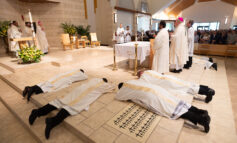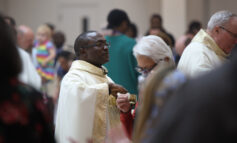By Father Thomas Esposito
Special to The Texas Catholic
The Swiss theologian Karl Barth is the author of a line that has always fascinated me: in the realm of nature, “Laughter is the closest thing to the grace of God” that we possess. I would like to explain why I think he is absolutely correct.
What makes us laugh? Perhaps a reflection on the silliness inherent in human affairs can be more illuminating than an anguished recommitment to the seriousness of one’s righteous cause or beliefs. Such thinking is certainly more refreshing than a constant dose of dourness, even for worthy matters; and refreshment is at the heart of the gift of humor.
We play an endless amount of what the philosopher Ludwig Wittgenstein calls “language games” – we are expected to behave in certain ways, and to utter certain lines in specific social encounters, once we have learned them. To play the game, for example, of greeting someone we know, the customary phrase of “Hello! How are you?” followed by an extended hand (or an elbow bump in the time of Covid) is typically answered with a “Fine, thanks” and the clasping of hands. If, however, the respondent blurts out not “Fine, thanks” but “Boogers!” – well, you have a pretty funny situation.
But what makes that encounter so humorous? The “Boogers!” fellow has interrupted the normal proceedings of the language game that we call the greeting. He has introduced some incongruence, something that just don’t seem to fit in that situation; he has cracked the limiting shell of the greeting, to the other person’s surprise.
That intrusion of something foreign to an expected outcome, the bursting in of lightheartedness when one is so accustomed to a formal encounter, is a hallmark of humor, the gift that provokes laughter and levity in the heart so weighed down with serious burdens. It is also the primary reason why laughter, to return to Barth’s quote, is such a natural parallel for the supernatural workings of grace. In the Christian understanding, grace is the “free and undeserved help that God gives us to respond to His call to become children of God,” but it’s much more exciting than that dry Catechism definition. You can think of grace as the penetration of divine light through the cracks of selfishness, sin, and despair at the state of the world or one’s soul. When tempted to think that you are left to your own devices and weaknesses, the grace of God is a life preserver thrown to you floating on the sea, a guide pointing your way out of the dark wood into which you entered, whether knowingly or not.
We become so serious as the burdens of adult life pile upon us, as we unconsciously accept that language games are all we play, and that the world of our experience, with all its injustice and misery, is the sum total of all existence. But babies are hilarious – literally, cheerful, and are so dang funny because they are incapable of taking themselves seriously. They do not play the limiting language games that so condition our thinking, but delight in the refreshing gift of laughter at the most random things.
Genuine humor does something similar to grace, to the beautiful experience of a baby’s squeals of playful laughter. It offers, strangely enough, a faint hint that something beyond our ordinary experience is capable of breaking in and invigorating our life, of reminding us that we need to be lifted up; it changes our perspective and lightens our troubled load, however briefly. Laughter, in this sense, is a linguistic deus ex machina; the sudden appearance of the god to bring a resolution to a Greek tragedy or comedy mirrors an unanticipated joke or moment of joy. “The mortal body weighs down the soul” (Wisdom 9:15); grace on the supernatural level and laughter on the natural provide the levity needed to “set our hearts on things above, where Christ is seated at the right hand of God” (Colossians 3:1).
“Laughter,” as G.K. Chesterton certainly knew from experience and provoked in others, “has something in it in common with the ancient winds of faith and inspiration; it unfreezes pride and unwinds secrecy; it makes men forget themselves in the presence of something greater than themselves.”
Father Thomas Esposito, O.Cist., is a monk at the Cistercian Abbey of Our Lady of Dallas and teaches in the theology department at the University of Dallas in Irving.



